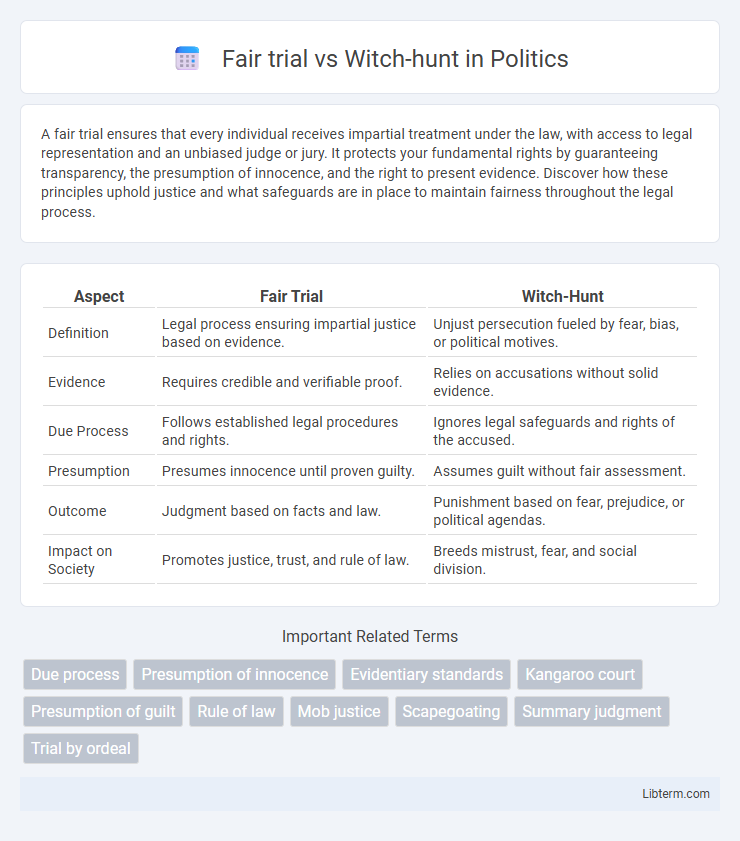A fair trial ensures that every individual receives impartial treatment under the law, with access to legal representation and an unbiased judge or jury. It protects your fundamental rights by guaranteeing transparency, the presumption of innocence, and the right to present evidence. Discover how these principles uphold justice and what safeguards are in place to maintain fairness throughout the legal process.
Table of Comparison
| Aspect | Fair Trial | Witch-Hunt |
|---|---|---|
| Definition | Legal process ensuring impartial justice based on evidence. | Unjust persecution fueled by fear, bias, or political motives. |
| Evidence | Requires credible and verifiable proof. | Relies on accusations without solid evidence. |
| Due Process | Follows established legal procedures and rights. | Ignores legal safeguards and rights of the accused. |
| Presumption | Presumes innocence until proven guilty. | Assumes guilt without fair assessment. |
| Outcome | Judgment based on facts and law. | Punishment based on fear, prejudice, or political agendas. |
| Impact on Society | Promotes justice, trust, and rule of law. | Breeds mistrust, fear, and social division. |
Understanding the Concept of a Fair Trial
A fair trial ensures impartiality, transparency, and adherence to legal rights, providing defendants with the opportunity to contest evidence and present a defense. In contrast, a witch-hunt involves biased accusations, lack of due process, and predetermined guilt driven by fear or prejudice. Understanding a fair trial emphasizes the importance of judicial independence, the presumption of innocence, and evidence-based judgments to uphold justice.
Defining a Witch-Hunt: Origins and Modern Use
A witch-hunt originally described historical campaigns to identify and punish alleged witches, rooted in superstition and fear rather than evidence-based justice. In modern usage, a witch-hunt refers to an unjust or irrational pursuit of individuals based on flimsy or fabricated accusations, bypassing fair trial principles such as due process and impartiality. This term highlights the contrast between objective legal standards and emotionally driven, biased investigations that undermine the rule of law.
Key Principles of Justice and Due Process
A fair trial upholds key principles of justice, including impartiality, the presumption of innocence, the right to legal representation, and transparent evidence evaluation, ensuring due process is meticulously followed. In contrast, a witch-hunt bypasses these safeguards, relying on bias, hysteria, and unsubstantiated accusations, which undermines fundamental rights and leads to wrongful convictions. Protecting due process and maintaining judicial integrity are essential to prevent miscarriages of justice that characterize witch-hunt scenarios.
Historical Examples: From Salem to Modern Courts
The Salem witch trials of 1692 exemplify a witch-hunt driven by mass hysteria and lack of due process, leading to wrongful convictions and executions based on flimsy evidence and fear. In contrast, modern courts emphasize fair trials grounded in legal standards, presumption of innocence, and evidentiary requirements to prevent miscarriages of justice. Historical lessons from Salem have shaped contemporary judicial procedures designed to protect individual rights and uphold the rule of law.
Signs of a Witch-Hunt in Legal Proceedings
Signs of a witch-hunt in legal proceedings include biased investigations, reliance on unsubstantiated accusations, and disregarding evidence that contradicts the prevailing narrative. Fair trials demand impartial judges, the presumption of innocence, and strict adherence to due process, whereas witch-hunts thrive on fear, prejudice, and the override of legal standards. The presence of public hysteria, political motivations, and secretive hearings further signal deviation from legitimate judicial norms.
Media Influence: Bias and Public Opinion
Media influence plays a crucial role in shaping public opinion during fair trials and witch-hunts, often amplifying bias through selective reporting and sensationalism. In fair trials, balanced media coverage aims to present evidence objectively, supporting the principle of impartiality, whereas witch-hunts are characterized by media-driven narratives that assume guilt without due process. This bias distorts public perception, undermining justice by pressuring legal outcomes and escalating social hysteria.
The Role of Evidence: Facts vs. Accusations
Evidence plays a pivotal role in ensuring a fair trial by emphasizing factual, verifiable information over mere accusations. In a witch-hunt, decisions are often driven by fear, rumors, or biases, disregarding objective proof and undermining justice. The integrity of the judicial process depends on the clear distinction between substantiated facts and unfounded allegations.
Protecting Rights: Legal Safeguards Against Witch-Hunts
Legal safeguards such as the presumption of innocence, the right to legal counsel, and the requirement for evidentiary proof are essential in protecting individuals from the arbitrary accusations characteristic of witch-hunts. Due process ensures that investigations and trials follow established rules, preventing miscarriages of justice fueled by fear, bias, or mass hysteria. Robust judicial oversight and transparency in legal proceedings safeguard fundamental human rights, maintaining fairness and accountability in the justice system.
Consequences of Unfair Trials
Unfair trials often lead to wrongful convictions, which undermine public trust in the justice system and perpetuate social injustice. Witch-hunts result in widespread fear, violence, and the targeting of innocent individuals based on hysteria rather than evidence. The consequences include loss of life, damaged reputations, and long-term societal division.
Ensuring Fair Trials in Contemporary Society
Ensuring fair trials in contemporary society requires strict adherence to impartial judicial processes, protection of defendants' rights, and transparent evidence evaluation to prevent miscarriages of justice often seen in witch-hunt scenarios. Modern legal systems emphasize due process, unbiased jury selection, and the presumption of innocence to safeguard against hysteria-driven prosecutions. Robust legal safeguards and continuous oversight promote fairness and uphold the integrity of the justice system.
Fair trial Infographic

 libterm.com
libterm.com